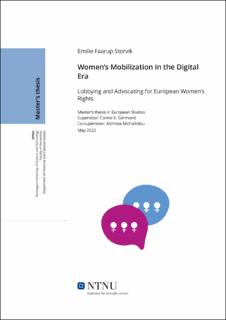| dc.contributor.advisor | Germond, Carine. S | |
| dc.contributor.advisor | Michailidou, Asimina | |
| dc.contributor.author | Storvik, Emilie Faarup | |
| dc.date.accessioned | 2022-06-21T17:19:38Z | |
| dc.date.available | 2022-06-21T17:19:38Z | |
| dc.date.issued | 2022 | |
| dc.identifier | no.ntnu:inspera:110607100:31539297 | |
| dc.identifier.uri | https://hdl.handle.net/11250/2999896 | |
| dc.description.abstract | Lobbyisme spiller en stor rolle i beslutningsprosessen i den europeiske union. De siste årene har flere interessegrupper har gått over til å oppnå politisk innflytelse gjennom sosiale medier. Denne oppgaven spør om denne sosiale medier-aktiviteten er en del av deres lobbystrategier mot EU eller ikke. Oppgaven bygger på eksisterende konseptuelle rammeverk for lobbystrategier for å analysere om og i så fall hvordan de to kvinnerettighetsorganisasjonene, European Women's Lobby og Young Feminist Europe, bruker sosiale medier som en del av sin lobbyvirksomhet mot EU. Den utforsker aktiviteten, synligheten og rekkevidden til de to kvinnerettighetsorganisasjonene og ser på bruken av funksjoner som vedlegg og hashtags. Oppgaven undersøker om sosiale medier er et "våpen for de svake" og om det kan erstatte tradisjonelle lobbystrategier. Denne studien er gjort gjennom en kartleggingsøvelse av innleggene som de to organisasjonene publiserer på Facebook, Instagram og Twitter, en innholdsanalyse av organisasjonenes innlegg og et intervju. Oppgaven bidrar til en dypere forståelse av hvordan interessegrupper i EU kan bruke sosiale medier til lobbyvirksomhet og fremhever forskjellene mellom to kvinneorganisasjoner i bruken og betydningen av sosiale medier. Hovedargumentet til oppgaven er at både European Women's Lobby og Young Feminist Europe bruker sosiale medier som en del av sine lobbystrategier. Sosiale medier er imidlertid viktigere for Young Feminist Europe enn European Women's Lobby. | |
| dc.description.abstract | Lobbyism plays a large part in the decision-making process in the European Union. Several interest groups have moved over to obtaining political influence through social media in the last few years. This thesis asks whether this online activity is a part of their lobbying strategies toward the European Union or not. The thesis draws upon existing conceptual frameworks of lobbying strategies to analyse whether and, if so, how the two women’s rights organisations, the European Women’s Lobby and Young Feminist Europe, use social media as a part of their lobbying toward the European Union. It explores the activity, visibility, and outreach of the two women’s rights organisations and looks at the use of features like attachments and hashtags. The paper examines whether social media is a “weapon of the weak” and if it can replace traditional lobbying strategies. This study is done through a mapping exercise of the posts that the two organisations publish on Facebook, Instagram, and Twitter, a content analysis of the organisations’ posts, and an interview. The thesis contributes to a deeper understanding of how interest groups in the European Union can use social media to lobby and highlights the differences between two women’s organisations in the usage and significance of social media. The main argument of the thesis is that both the European Women’s Lobby and Young Feminist Europe use social media as a part of their lobbying strategies. However, it is more vital to Young Feminist Europe than the European Women’s Lobby. | |
| dc.language | eng | |
| dc.publisher | NTNU | |
| dc.title | Women’s Mobilization in the Digital Era: Lobbying and Advocating for European Women’s Rights | |
| dc.type | Master thesis | |
